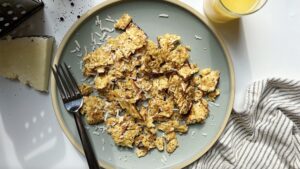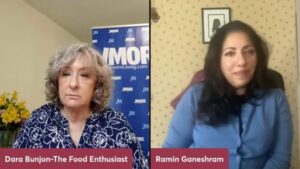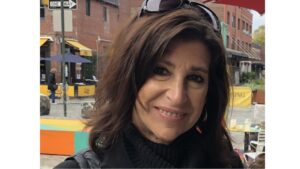As kosher wine fans, we are fortunate to be living in — as I like to call it — the “Goldeneh Age of Kosher Wine.” Perhaps not since Temple times (and likely ever) has the world seen so many new and exciting ventures in kosher winemaking, particularly with premium wine.
Israel, for its part, has placed itself on the map of notable regions with its diverse topography, range of elevations and soils, and Mediterranean climate. Many of the great winemaking regions around the world now boast examples of kosher wines, including France, Italy, Spain, Argentina, Australia, New Zealand, South Africa and, of course, right here in the States in such famous areas as Napa and Sonoma, among others.
But what you may not have realized is that one man has worked earnestly for a number of years to produce premium wine — which happens to be kosher — in the Lehigh Valley of southeastern Pennsylvania. You may not think of the Keystone State when it comes to wine, but the Lehigh Valley’s region’s well-drained shale and limestone soil are similar to regions of France and well-suited for grapes.
Kevin Danna is the dreamer, founder and winemaker at Binah Winery, and has realized his dream of making premium, handcrafted wine in his now-hometown of Allentown, Pa.
I was able to get my hands on some bottles of Binah’s first 2019 releases, the Binah Stella White and the 2019 Binah Winery Rosé, and was so intrigued by both the wine, its varietals and the story behind them, that I reached out to Danna, who was kind enough to answer some questions.
The Kosher Decanter: Hey, Kevin, tell us a little about where you grew up, your education, family and Jewish background.
Danna: I am a native of the Pomona Valley in southern California, about 30-40 miles east of Los Angeles in the Inland Empire. My parents both grew up in Wilkes-Barre, Pa., and after my parents divorced, my mom moved back to the East Coast. As a result, I attended elementary and high school in northern Delaware, while spending my summers and vacation time back with my dad in California.
I attended Penn State University, where I studied architectural engineering and was a member of the Marching Blue Band (percussion) before starting my first career in architectural lighting design with C.M. Kling and Associates in Alexandria, Va. During college, I started to become more interested in depth with Judaism while beginning to dabble in more traditional observance. It was the start of a half-decade-long move toward Orthodox practice. My Jewish upbringing was more Conservative.
How did you get interested in winemaking?
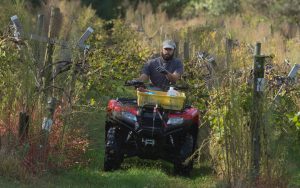
to start my own winery.” (Provided Photo)
I started drinking more wine during my time in Virginia as a result of my growing Shabbat observance. Both of my paternal great-grandfathers were from Sicily, and like so many other Italian-Americans at the time, made their own wine at home from grapes hauled to the East Coast from California. I remember seeing their old wine barrels when I was a little boy and hearing the stories of the family making wine together.
It was around 2013 when I was thinking seriously about a career change when Tuvia Natkin, a friend of a friend, suggested that I get into winemaking. He had a winemaker friend in Israel. When my wife, Sarah, and I moved to Allentown, Pa., later that year, I got more serious about the idea and started making wine in my basement in the spring of 2014 from Chilean grapes I picked up from a local homebrew store.
A few months later, I enrolled in a two-year enology and viticulture college certificate program in Pennsylvania. During this time, I started working at Pinnacle Ridge Winery in Kutztown, Pa., and worked my way up to assistant winemaker, developing my skills alongside winemaker Brad Knapp.
From the beginning, my goal was to start my own winery, and after a few years at Pinnacle Ridge, I decided to make the dive, founding Binah Winery. I leased a five-acre vineyard in Easton, Pa., and farmed the 2019 vintage grapes almost entirely by myself with the help of family and friends. I opted out of renewing that lease and moved the winery-only operation to Allentown, where I currently reside.
Why did you decide to start a winery in Pennsylvania?
Because I live here, and this region has great potential in viticulture and winemaking. It is a cool-climate region similar to part of northern France, Germany and Eastern Europe. I saw the opportunity to bring to the kosher market cool-climate grape varieties and wines, along with eastern North American wine styles not yet seen.
What are your plans for “Binah’s take” on kosher wine in upcoming years?
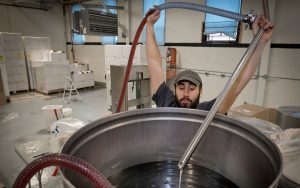
were grown in.” (Provided photo)
My take with Binah Winery is to produce world-class wines from northeast/Mid-Atlantic-grown fruit. The wines happen to be kosher, but essentially they are clean and exquisite expressions of the time and place the grapes were grown in. From there, you will have to wait and see what I have planned.
What do you think is the future of kosher wine?
What do I think is the ultimate fate of kosher wine? Well, that’s an entirely different discussion. In the short-term, I think the kosher wine market moves toward tracking the overall wine market better. I think there will be a cleaning of the market to some degree with a stratification of a lot of bulk, quaffable wine alongside a trend toward premiumization, where a handful of boutique wineries really begin to excel, rivaling their non-kosher counterparts at the highest levels.
What wines are you drinking?
Anything and everything kosher I can get my hands on. I have an affection for the reliability of French wines and the allure of cool-climate wines from all over the world. There is a certain elegance in them and seduction in what is not in the wines. It is a kind of negative space where subtleties linger.
I also enjoy hot-climate reds though and have a particular soft spot for Zinfandel, something of limited supply in the kosher market. I will leave you to dwell on that.
And dwell, I will. Until then, here are my tasting notes on Binah’s two current 2019 releases:
2019 Binah Winery Rosé
To be honest, I’m somewhat tired of rosé. The wine market is cyclical and trendy, and the recent trend was to rosé. But at least in the kosher world, there’s been a glut of bad rosé — at least those which I found not enjoyable.
To me, rosé should be affordable, drinkable and fun. Many of the new vintages of rosé have not really hit shelves yet. Still, I was very interested to taste what would come out of this upstart winery in Allentown, Pa.
The winery tells us that the 2019 Binah Rosé is a blend from select grape varieties grown in the Lehigh Valley, including Cabernet Franc, and two varietals with which I was not familiar: Blaufränkisch, and Chambourcin.
I very much love that Binah is using grapes that are suitable to its cold-weather climate and producing new and interesting varietals to the kosher market.
The rosé is a very dark, and deep salmon color. There is a hyper-floral nose of blooming spring lilacs and roses. The body is medium-minus with fresh acid upfront. I’d characterize the wine as dry to just off-dry.
The palate shows loads of red berries; strawberries and tart raspberries, with more tingly acid on the finish.
I was (very happily) surprised to find less sweetness than the color seemed to promise.
Perhaps it was the addition of Blaufränkisch, a prized Austrian grape known for its late-ripening, rich black fruit?
Or the Chambourcin, a French-American hybrid which is a teinturier, a grape rich in anthocyanin pigment, which means the grape itself has red juice?
Perhaps the winemaker used the saignée method, which would produce this darker hue? I asked Kevin, who replied, “Yes, the dark hue is from the intensely red Chambourcin juice and a fraction of saignée from Cab Franc, Blaufränkisch, and Chambourcin red wine fermentations up to 24 hours after crush.”
A really fun rosé ($19, binahwinery.com) which I’d recommend with some rustic bread and this artichoke-olive antipasto from Shushy Turin, (IG: @cookinginheelss: https://www.kosher.com/recipe/antipasto-5717)
Binah Stella Dry White Wine 2019
The 2019 Stella Dry White is a blend of varietals of which you may have never heard: Seyval Blanc, Chardonel and Vignoles. These French-American hybrids are suitable for cooler climates such as that of the Lehigh Valley, which is comparable to the climate of central and northern Europe.
Binah Winery smartly chose these hybrid varietals that are befitting of the cold climate of Pennsylvania, budding late to avoid early spring frosts and ripening late. The wine displays a clear, bright straw color. There is a clean, intensely opulent nose of apricot and peach, citrus, pear, honeysuckle and geranium.
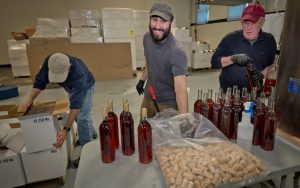
has in store for the future.
The wine is dry to just off-dry and is medium-minus to medium-bodied, with bright, medium-plus, lingering acidity. The acid is very nicely balanced with the fruit.
On the palate, there is some vanilla on the mid-palate. I find similarities to a Muscat-Riesling or off-dry Alsace white in both aroma and on the palate. There is a long, really bristling, and tangy finish.
The 2019 Binah Stella Dry White ($18 binahwinery.com) is an impressive and interesting offering. I’d pair with kosher “crab” cakes. I have my own spin, which helped me and my two partners capture the inaugural 2018 “Charm City Kosher Chopped Competition,” but here’s a worthy recipe from a dear friend, the inventive mad genius, Nossi Fogel, AKA “The Kosher Gastronome:” https://thekoshergastronome.wordpress.com/2010/11/21/crab-cakes/ Don’t forget the Old Bay and plenty of lemon!
In any case, it’s my pleasure to introduce new winemakers to the kosher wine world, and an even greater pleasure when I can honestly say I recommend the wines they create.
Here’s to looking forward to what Binah Winery has in store for the future. Wishing them much mazal and hatzlacha!

Dr. Kenneth Friedman is a Baltimore-born kosher wine (and sometimes beer) aficionado/connoisseur. He is known for his unsolicited wine advice and runs many local kosher wine tastings. You can follow him on Instagram @KennethFriedmanEvents.



